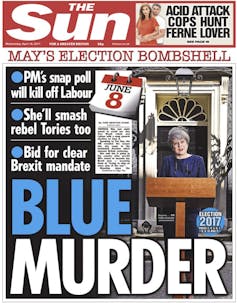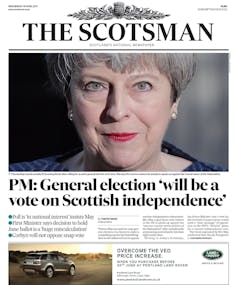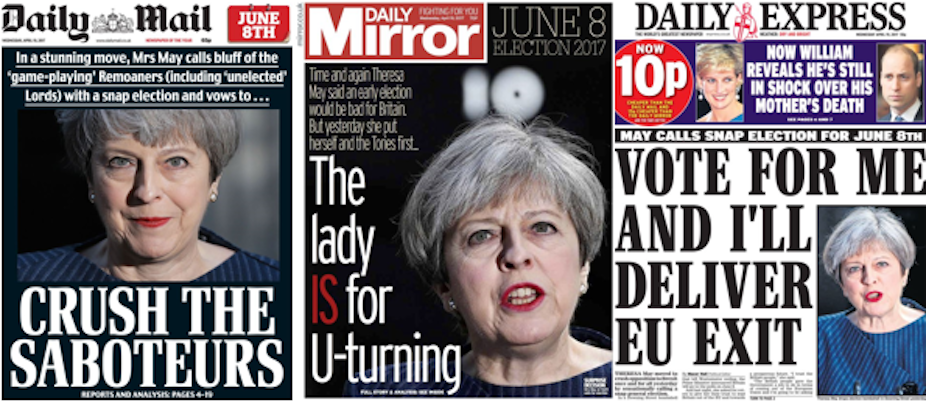It was the Daily Mail headline that caught most people’s eye as they sat down to read press reaction to Theresa May’s snap election announcement. “Crush the Saboteurs”, screamed the paper’s front page below a write-off which congratulated the prime minister on a “stunning move” that would call the bluff of the “game-playing” Remoaners – including the “unelected Lords”.
In its contempt for the constitutional niceties, the Mail’s front page recalled its condemnation of the UK’s Supreme Court justices as “Enemies of the People” in November 2016 for ruling that the government would have to consult parliament before triggering Article 50 and setting Brexit into motion.
Brexit, unsurprisingly, is what this election will be all about – at least as far as most of Fleet Street is concerned on the first day after May’s announcement. But the way this is represented differs wildly across the press spectrum. Some papers primarily see the election as May’s push for a more powerful mandate – designed to give the prime minister a larger parliamentary majority in order to strengthen her hand during negotiations with the EU.
May is cast as the key player, with her personal desires and preferred outcomes represented as the key reasoning for calling this election, despite her repeated assurances that she wasn’t going to go to the polls any earlier than 2020.
The Daily Mirror, perhaps seeking to echo many of its Labour-voting readers, went with this: “The Lady is for U-turning” – a rather sniffy reference to Margaret Thatcher’s famous mantra to highlight what the Mirror wants to portray as a gulf between the Conservatives’ most popular prime minister and the unelected May.
The Guardian, meanwhile, is more nuanced – its lead story, “Give me my mandate”, reflects the paper’s position that the prime minister will want a convincing victory to shore up her position, both within the Conservative party and during negotiations in Brussels.

For the Daily Express, a victory for May is explicitly framed as a vote for Brexit – she wins, and she personally will deliver on the promise to leave.
The battlefield rhetoric of the Mail is echoed in other papers such as The Sun and its portrayal of “Blue murder” as May pushes to “kill” Labour and Tory rebel attempts to hinder Brexit.
These fiery, populist takes on the election call have likely enraged as many as they have entertained, with the tragic and violent death of MP Jo Cox lending unsettling context to such inflammatory tabloid language.
Dissenting voices
Other leading voices of dissent are found in Scotland, with The Herald accusing the PM of gambling the nation’s future on her push for a stronger Brexit mandate. The Scotsman, meanwhile, rather cleverly echoed some of May’s own words, calling the election a vote for independence. Although not the sort the prime minister is thinking of.

This one example, however, stands isolated. The first round of election front pages cast Brexit and Theresa May as the key issues from the start. And most are presenting the decision to call an election as a leader’s sensible desire for a more powerful mandate when it comes to negotiating greater authority on future policy regarding Brexit. Depending on the style of paper, this is either a pragmatic political move or a fiery declaration of war on the “enemy” – anyone opposed to leaving the EU.
What the Daily Telegraph referred to as a “bolt from the Blue” has collectively sparked the British political press back into overdrive. During the campaign, different issues will come and go (and it will be Corbyn’s turn to get some personal – and probably unflattering – attention soon enough). But for now the stalls are set – this election means Brexit.
Amid this early atmosphere of Brexit fever, grand declarations and outrageous rallying cries, there was a curious oddity in the form of London’s Evening Standard. The recent appointment of George Osborne as editor sparked considerable reaction – not least here at The Conversation – and the election announcement must have prompted many observers to wait in keen anticipation for how this usually Conservative paper, now overseen by former Chancellor and a leading Remain champion, would respond.
How would Osborne deal with this first big test? Which set of critics would his first really big front page anger the most? Would he toe the party line or would this continuing Brexit rebel use his new toy to push a personal angle? In the end, the Standard delivered the most staid of realities: “PM calls June 8 election”. Of course, we now know he was planning to follow this with the far more interesting news that this would be an election he wouldn’t contest.

